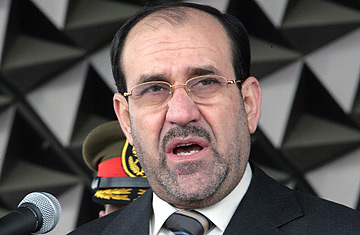
Iraqi Prime Minister Nuri Al-Maliki speaks during celebrations for Iraqi Army Day on January 6, 2007 at the Tomb of the Unknown Soldier in Baghdad.
"The Baghdad security plan will not offer a safe shelter for outlaws regardless of their ethnic and political affiliations, and we will punish anyone who hesitates to implement orders because of his ethnic and political background," Maliki said during an address in Baghdad marking the 85th anniversary celebration of the Iraqi army. "We are full aware that implementing the plan will lead to some harassment to all of beloved Baghdad's residents, but we are confident that they fully understand the brutal terrorist attacks Iraq faces."
Baghdad isn't the only place where patience for Maliki is wearing thin. While in public President Bush has always expressed support for him, the White House has begun to signal its unease. Even Bush joined the chorus of voices condemning the way Maliki's government handled the execution of Saddam Hussein. And disagreements over strategy are becoming more apparent. For example, Maliki had pressed Bush to move U.S. troops from central Baghdad to the edge of the city, leaving the volatile downtown area in the hands of Iraq security forces. Instead, the White House's emerging strategy has most of a U.S. troops surge headed into downtown Baghdad.
The big card Maliki always held was his alliance with the political bloc led by Moqtada al-Sadr, the head of the Shi'a Mahdi militia. This includes 30 parliamentarians and six cabinet members. Maliki was seen as one person who might be able to exercise some sway over Sadr and his lawless sectarian army. But it became clear that influence flowed only one way between Sadr and Maliki in October, when U.S. forces seized Sadr aide Sheik Mazin al-Saedi, a suspected organizer of kidnapping rings and death squads. Maliki immediately called for Saedi's release, and the U.S. military complied. Killings were on the rise, and Maliki was working to help the leading murderers; Sadr's Mahdi Army dropped virtually all pretenses of restraint after the February bombing of a Shi'ite shrine in Samarra and went on the attack.
Maliki can only hope the White House grants him more time. Yet many in Iraq are hoping U.S. patience is at an end. It's difficult to find anyone here outside Maliki's circle of supporters who thinks his government has a role to play in any strategy that might help Iraq at this point. "I see the political situation in Iraq as a deadlock," says Wamydh Nadhmi, a professor of political science at Baghdad University. "I still believe in the future of Iraq - if Mr. Bush brings us radical change."
Maliki himself appears worn down. The expressionless look on his face is almost always the same when he appears in public. His eyes droop heavily behind glasses, and his jowly chin usually carries the shadow of a beard - making him look as though he just stepped off an overnight plane flight. The former exile's homely anonymity seemed to bring a measure of comfort to watchers of Iraqi politics when he emerged as a compromise pick for prime minister in April. Few had heard of Maliki, and fewer still knew much of anything about him. Maliki was a political figure with no baggage and a faint profile, two traits widely viewed as assets. But for many Iraqis the blank space on Maliki's face has filled in since then with reflections of the country's deepest problems. To look at Maliki now is to see streets shattered by car bombs, parading militia fighters and masked hangmen making basement snuff videos.
